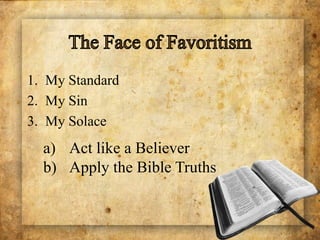Favoritism, also known as partiality or bias, is the act of showing preferential treatment to one person or group over others. It is a common human flaw that has been present throughout history and is addressed in many religious texts, including the Bible.
In the Old Testament, favoritism is condemned as a sin. In James 2:1-9, it is written, "My brothers and sisters, do you with your acts of favoritism really believe in our glorious Lord Jesus Christ? For if a person with gold rings and in fine clothes comes into your assembly, and if a poor person in dirty clothes also comes in, and if you take notice of the one wearing the fine clothes and say, 'Have a seat here, please,' while to the one who is poor you say, 'Stand there,' or, 'Sit at my feet,' have you not made distinctions among yourselves, and become judges with evil thoughts?" This passage illustrates the hypocrisy of showing favoritism based on external appearances or social status, and warns against judging others in this way.
In the New Testament, Jesus himself challenges favoritism and discrimination. In the parable of the Good Samaritan, Jesus tells the story of a man who is robbed and left for dead on the side of the road. A priest and a Levite pass by and do nothing to help, but a Samaritan, a group of people who were hated by the Jews, stops and helps the man. Jesus tells this story to illustrate that love and compassion should be shown to all people, regardless of their background or perceived worth.
Favoritism can also be seen in the way that God treats his people in the Bible. In Romans 9:11-13, it is written, "Though they were not yet born and had done nothing either good or bad—in order that God's purpose of election might continue, not because of works but because of his call—she was told, 'The older will serve the younger.' As it is written, 'Jacob I loved, but Esau I hated.'" This passage shows that God chose Jacob, the younger brother, to be the father of the Israelite people, even though Esau, the older brother, was born first. This seems like favoritism, but it was actually part of God's plan and purpose for his people.
Overall, the Bible clearly condemns favoritism and teaches that all people should be treated with love, compassion, and respect. It challenges us to look beyond external appearances and social status, and to see the inherent worth and value in every person.







